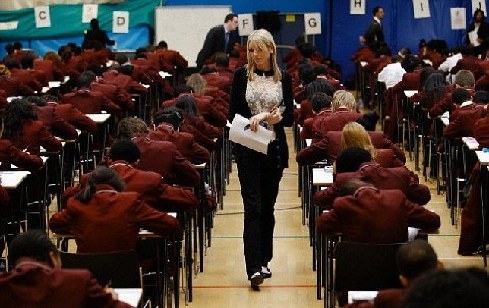當前位置: Language Tips> 雙語新聞
Deprived children are 6 IQ points worse off than wealthy peers
分享到
Poverty affects the intelligence of children as young as two, a study has found - and its impact increases as the child ages.
英國一項研究發現,貧窮會影響年僅兩歲兒童的智力,且影響力會隨年齡增長而加強。
Deprived young children were found to have IQ scores six points lower, on average, than children from wealthier families.
貧困家庭兒童的IQ(智力商數)比富裕家庭兒童平均低六分。
And the gap got wider throughout childhood, with the early difference tripling by the time the children reached adolescence.
隨著兒童的年齡漸長,該差距會逐漸拉大,到步入青春期時窮人家的孩子與富人家孩子的智商差距會比幼兒期大兩倍。

Scientists from Goldsmiths, University of London compared data on almost 15,000 children and their parents as part of the Twins Early Development Study (Teds).
來自倫敦金史密斯大學的科學家比較分析了近一萬五千名兒童及其父母的資料,這些資料是孿生兒童早期發展研究(Teds)的部分數據。
The study is an on-going investigation socio-economic and genetic links to intelligence.
孿生兒童早期發展研究致力于智力與社會經濟和遺傳的關系研究,目前仍在進行。
Children were assessed nine times between the ages of two and 16, using a mixture of parent-administered, web and telephone-based tests.
研究綜合了包括家長執行的測試和基于網絡、電話的多種測試后,對年齡在兩歲和十六歲間的兒童進行九次分析。
The results, published in the journal Intelligence, revealed that children from wealthier backgrounds with more opportunities scored higher in IQ tests at the age of two, and experienced greater IQ gains over time.
這項發表于《智力》(Intelligence)雜志的研究結果顯示,兩歲兒童的家庭經濟背景越好,其智商獲高分的幾率越大,日后的智商增長也更大。
Dr Sophie von Stumm, from Goldsmiths, University of London, who led the study, said: 'We’ve known for some time that children from low socioeconomic status (SES) backgrounds perform on average worse on intelligence tests than children from higher SES backgrounds, but the developmental relationship between intelligence and SES had not been previously shown.
來自倫敦金史密斯大學的索菲·馮·斯蒂姆博士是該研究的負責人,他說:“目前我們的認知是:社會經濟地位背景低的孩子,其智力測試結果普遍比家庭背景好的孩子差。但我們還未找到智力和社會經濟地位的深層關系。
'Our research establishes that relationship, highlighting the link between SES and IQ.
“我們的研究確認了兩者存在聯系,突出了社會經濟地位和智商二者的關系。
'We hope that our findings will drive future research into the specific mechanisms and factors that underpin the link between SES and IQ and thus, contribute to widening the IQ gap.'
“我們希望我們的發現能推動今后對加強這二者關系進而擴大智商鴻溝的特定機制和因素進行研究。”
Last year, a study by the University of Exeter revealed that children from poor backgrounds and one-parent families are more likely to suffer from attention deficit hyperactivity disorder, which could affect their ability to excel at school.
2013年,英國埃克賽特大學一項研究表明,貧困家庭和單親家庭的兒童患小兒多動癥(ADHD)的概率更高。小兒多動癥又稱注意缺陷多動障礙,這種疾病會影響兒童的學習表現。
Researchers found a link between social and economic status and childhood ADHD in Britain by analysing data from the Millennium Cohort Study - a database of more than 19,500 British children born between 2000 and 2002.
研究者通過分析來自“千禧隊列研究”項目(Millennium Cohort Study)的數據,發現了社會經濟地位與兒童小兒多動癥之間的聯系,該項目收集了出生于2000年至2002年期間超過一萬九千五百名英國兒童的數據。

The study, published in the Journal of Child Psychology and Psychiatry, showed that there was a greater prevalence of ADHD among children from families living below the poverty line.
這項發表于《兒童心理學與精神疾病學》雜志的研究結果顯示,生活在貧困線以下的兒童更容易患小兒多動癥。
The researchers found the average family income for a household with a child affected by ADHD was £324 ($509) per week, compared to £391 ($614) for those with unaffected children.
研究發現,有一名小兒多動癥兒童的家庭,其平均一周收入為324英鎊(509美元),而普通家庭為391英鎊(614美元)。
They also revealed that the chance of parents in social housing having a child with ADHD was roughly three times greater than for those who owned their own homes.
研究結果還顯示,小兒多動癥兒童的父母居住在社會福利房的幾率是擁有私人住房的父母的三倍。
Mothers with no qualifications were more than twice as likely to have a child with ADHD as those with degrees, and lone parents were more likely to have a child with ADHD than households with two live-in parents.
無學位的母親,其孩子患小兒多動癥的幾率比有學位的母親的孩子高兩倍以上;和單親家長生活的孩子,其患小兒多動癥的幾率比和父母共同生活的孩子高。
(譯者 佳木China 編輯 陳丹妮)
上一篇 : 染頭發已不新鮮 如今流行染腋毛
下一篇 : 多次書寫紙 打印不用墨
分享到
關注和訂閱


電話:8610-84883645
傳真:8610-84883500
Email: languagetips@chinadaily.com.cn